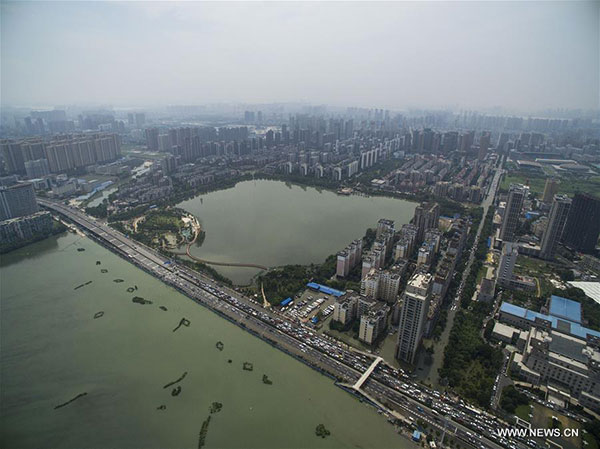'Sponge cities' plan to reduce flooding
Updated: 2016-07-09 07:23
By Tan Yingzi(China Daily)
|
|||||||||
 |
|
The aerial photo taken on July 8, 2016 shows waterlogged communities near the Nanhu Lake in Wuhan, capital of Central China's Hubei province. Drainage of waterlogged areas near the Nanhu Lake is still underway. [Photo/Xinhua] |
When Wei Yingyan poured a bottle of water onto the ground at the Yuelai Convention Center Park in Liangjiang New Area in the southwestern municipality of Chongqing, the liquid disappeared into permeable pavements within seconds.
"During heavy rainfall, the water is soaked up by the porous bricks and flood-tolerant plants to prevent flooding," said Wei, urban design director of Chongqing Yuelai Investment Group. "We collect and store most of it, then use it for irrigation or cleaning."
The park is a showcase for China's urban-planning efforts. In recent years, poor drainage systems and a rise in the number of extreme weather incidents have resulted in many cities experiencing heavy rain and flooding.
Under UN standards, about half the 657 cities assessed by the Ministry of Housing and Urban-Rural Development are classified as "water scarce" or "severely water scarce".
Yuelai New City in Chongqing was one of 16 "sponge cities" on a pilot list of climate-resilient urban designs released last year.
Mountainous Chongqing is looking for ways to solve drainage problems in similar cities in western China.
To prevent flooding, sponge cities store rainwater and release it during times of drought.
Founded in 2010, Liangjiang New Area was the third national development and opening zone to gain State Council approval, after Pudong New Area in Shanghai and Tianjin's Binhai New Area.
"Liangjiang is home to many pilot projects; one of them is the construction of a green, sustainable city," said Tang Zongwei, deputy director of the Liangjiang New Area Administrative Committee. "The area should have booming industries and a beautiful environment."
Chongqing also helps protect the Yangtze River from polluted rainwater. "We store and reuse most of the water, so only a small amount is filtered and discharged into the river," Wei said.
The hillside park has a layered underground drainage system that recycles rainwater before it is reused or discharged into the river.
Yuelai Group will invest 4.3 billion yuan ($650 million) to build a 18.57-square-kilometer sponge city, said Xiong Jiran, the general manager.
"It's not a big investment but it will produce huge benefits, both environmentally and commercially," he said.
Related Stories
On the front lines of China's flood battle 2016-07-08 17:26
Flood insurance necessary 2016-07-08 07:39
Animals run for freedom during flood 2016-07-08 07:38
Flood insurance necessary 2016-07-08 06:55
Today's Top News
Suspect in Dallas attack wanted to 'kill white people'
5 Dallas police killed at protest against police shooting
Ministry slams US-Korean THAAD deployment
Shoring up support
UK Iraq report highly critical of Tony Blair
UK invasion of Iraq was not last resort: Report
Berlusconi accepts Chinese offer for AC Milan
UK consultancy loses license, Chinese graduates being told to leave
Hot Topics
Lunar probe , China growth forecasts, Emission rules get tougher, China seen through 'colored lens', International board,
Editor's Picks

|

|

|

|

|

|







